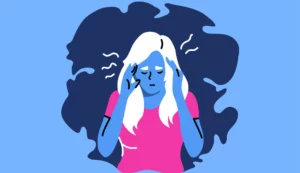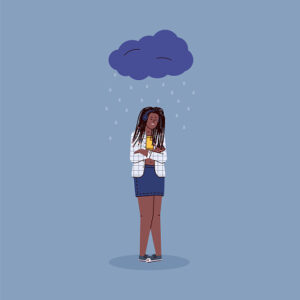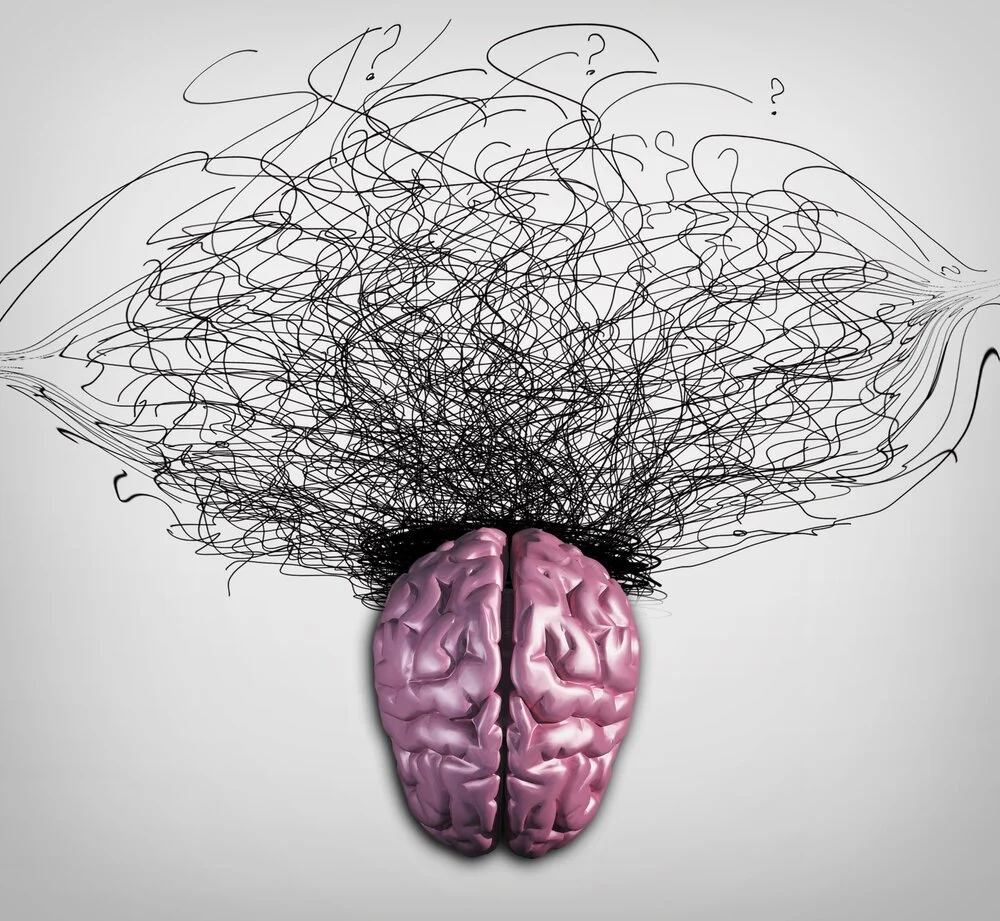Do you feel overwhelmed by the amount of sensory information that is coming at you? Do you find it hard to focus on one task because there are so many things competing for your attention? If so, you may be struggling with overstimulation anxiety. This is a condition that is becoming more and more common in our society, as we are constantly bombarded with stimuli from all directions. In this blog post, we will discuss what overstimulation anxiety is, and provide some tips for how to deal with it.
Contents
Defining Overstimulation Anxiety
Overstimulation anxiety is a condition characterized by an overwhelming feeling of anxiety or stress in response to sensory input. This can include things like loud noises, bright lights, strong smells, and chaotic environments. For people with overstimulation anxiety, exposure to these stimuli can trigger a fight-or-flight response, causing them to feel panicked or out of control. In severe cases, this can lead to a full-blown panic attack.
While overstimulation anxiety is not technically classified as an official diagnosis, it is believed to be a real and valid condition that affects many people. It is often comorbid with other conditions such as ADHD, autism spectrum disorder, and generalized anxiety disorder.
What Do Sensory Issues In Anxiety Look Like?

There are a few different ways that sensory issues can manifest in people with overstimulation anxiety.
- For some, it may be that they are simply sensitive to certain stimuli and find it uncomfortable or overwhelming when exposed to them.
- For others, exposure to certain stimuli can actually cause pain. And for some people, exposure to certain stimuli can trigger a full-blown panic attack.
- Sensitivity to light, sound, and touch are the most common sensory issues experienced by people with overstimulation anxiety.
- Some people may also have difficulty with proprioception (the sense of where your body is in space) or vestibular processing (the sense of balance and movement). These difficulties can make everyday activities such as driving or going to the grocery store extremely challenging and anxiety-provoking.
It is also important to note that not all people with overstimulation anxiety will experience all of these symptoms. Everyone experiences anxiety in their own unique way.
Related Conditions
As we mentioned earlier, overstimulation anxiety is often comorbid with other conditions.
People with ADHD tend to be more sensitive to stimuli than those without the condition. This can make it difficult for them to focus on one task and pay attention in noisy or chaotic environments.
People on the autism spectrum often have difficulty processing sensory information. This can lead to a feeling of being overwhelmed or overloaded when exposed to certain stimuli.
Generalized anxiety disorder is characterized by chronic worry and tension. For people with this condition, exposure to any type of stressor (including sensory input) can trigger an anxiety attack.
PTSD is another condition that is often comorbid with overstimulation anxiety. People with PTSD may have flashbacks or intrusive thoughts triggered by certain stimuli (such as a loud noise). This can be extremely distressing and lead to a feeling of being out of control.
Tourette’s syndrome is a condition that is characterized by tics and involuntary movements. People with Tourette’s may find certain stimuli (such as loud noises) to be particularly triggering and may have difficulty controlling their response to it.
Signs And Symptoms
There are a few different signs and symptoms of overstimulation anxiety. These include:
- feeling agitated or on edge
- thinking that you need to escape or get away from the trigger
- feelings of losing control
- feeling dizzy, lightheaded, or nauseous
- difficulty processing information
- temper tantrums
- feeling like you are in “fight-or-flight” mode
- difficulty regulating emotions
- having difficulty concentrating or focusing on anything other than the trigger
- feeling your heart racing or pounding
- sweating, trembling or shaking
- panic attacks
- shortness of breath
- headaches
- insomnia
- fatigue
- irritability
The symptoms of overstimulation anxiety can vary from mild to severe. For some people, the symptoms may be so severe that they feel like they are having a panic attack. If you are experiencing any of these symptoms, it is important to seek help to manage your symptoms.
Causes Of Overstimulation Anxiety

There is no single cause of overstimulation anxiety. However, some researchers have proposed the following reasons for anxiety issues. They are:
History of trauma or abuse: This can lead to a feeling of being constantly on edge and hypervigilant.
History of neglect: This can lead to difficulty regulating emotions and increased sensitivity to stressors.
Family history of anxiety or mental illness: This may mean that you are more likely to develop anxiety yourself.
Brain chemistry: Imbalances in certain neurotransmitters (such as serotonin) have been linked to anxiety disorders.
Stressful life events: Trauma, loss, or major life transitions can all trigger the development of anxiety.
Use of stimulant medications: These can increase anxiety levels and make it more difficult to cope with stress.
Withdrawal from substances: This can also lead to increased anxiety levels and make it more difficult to cope with stress.
Living with a chronic illness: This can lead to increased worry and stress
It is also worth noting that our society has become increasingly fast-paced and technology-driven in recent years. This constant barrage of sensory information can contribute to feelings of anxiety and overwhelm for many people.
Everyday Triggers In Overstimulation Anxiety
There are a few different things that can trigger overstimulation anxiety. These include:
- Loud noises
- Bright lights
- Strong smells
- Chaotic environments
- Fluctuations in temperature
- Emotionally burdening events (eg: funerals)
- Crowded places
- Prolonged exposure to technology
- Stimulant medications
- Stimulating activities (such as watching television or using a computer)
It is important to note that what triggers overstimulation anxiety will vary from person to person. What bothers one person may not bother another. It is also important to note that not all sensory input will trigger a reaction in someone with overstimulation anxiety.
Effects On Everyday Life

Overstimulation anxiety can have a significant impact on everyday life. People with this condition may:
- Avoid certain activities or places
- Have difficulty concentrating
- Experience problems with memory
- Find it hard to stay organized
- Struggle to complete tasks
- Become easily overwhelmed
- Feel constantly on edge
- Have difficulty sleeping
- Have trouble with work or school
- Isolate themselves from others
- Develop panic attacks or anxiety attacks
- Suffer from physical symptoms such as headaches, stomachaches, or dizziness
- Exhibit physical symptoms such as trembling, sweating, or a racing heart
People with overstimulation anxiety may also suffer from depression, social anxiety, and agoraphobia. This can make it difficult for them to lead a normal life. In severe cases, people with overstimulation anxiety may also become housebound or even bedridden.
As you can see, overstimulation anxiety can be very debilitating. It can make it difficult to function in day-to-day life. If you think you might be suffering from this condition, it is important to seek help from a mental health professional.
Treating Overstimulation Anxiety
While anxiety disorders don’t have a permanent cure or fix, there are various ways through which one can learn to manage and reduce the side effects of the side effects and lead a quality life.
Professional Help
There are a few different treatment options available for overstimulation anxiety. These include:
Cognitive-behavioral therapy: This type of therapy can help you identify and change the negative thoughts and behaviors that contribute to your anxiety.
Exposure therapy: This type of therapy involves gradually exposing yourself to the trigger in a safe and controlled environment. This can help you learn to manage your reactions and eventually desensitize yourself to the trigger.
Medication: There are a few different types of medication that can be used to treat overstimulation anxiety. These include anti-anxiety medications, beta-blockers, and antidepressants.
Relaxation techniques: This can help you manage your symptoms by teaching you how to control your body’s stress response.
Support groups: This can provide you with a safe and supportive environment to share your experiences and learn from others who are dealing with similar issues.
It is important to note that not all treatment options will work for everyone. It is crucial to work with a mental health professional to further find the best treatment plan for you.
Self Help Tips
There are a few things that you can do to help yourself deal with overstimulation anxiety. These include:
Developing a support network: This can provide you with a safe and supportive environment to share your experiences and learn from others who are dealing with similar issues.
Identify your triggers: This can help you avoid or prepare for situations that may trigger your anxiety. Once you know your triggers, you can develop a plan to deal with them.
Manage your environment: This can involve things like avoiding loud noises, bright lights, or strong smells. You may also want to limit your exposure to the trigger if possible.
Create a safe space: This can be a place where you feel comfortable and relaxed. This can be used as a place to retreat when you are feeling overwhelmed. You can do so by filling it with things that make you feel safe and comfortable.
Develop a coping plan: This can help you manage your symptoms when they occur. This may include things like deep breathing exercises, visualization, or positive self-talk. In the event of a panic attack, it is important to remember that you are not in danger and that the symptoms will eventually subside.
Carrying a fidget toy: This can help you to keep your hands busy and distracted from the trigger. This also provides a way to release any excess energy that you may be feeling.
Wearing noise-canceling headphones: This can help to reduce the amount of noise that you are exposed to. It also allows you to control the level of noise that you are exposed to.
Preparing for exposure: If you know you will be exposed to a trigger, it is important to prepare yourself mentally and emotionally. This can help you manage your reactions and reduce the impact of the trigger.
Getting enough sleep: This can help reduce stress and improve your overall well-being. This helps your body and mind to recover from the day and prepare for the next one.
Eating a balanced diet: This can help improve your overall health and well-being. This can also help to reduce stress levels. Including foods such as fruits, vegetables, whole grains, and lean protein in your diet can help to improve your mental health.
Exercising regularly: This can help to reduce stress levels and improve your overall well-being. It is important to find an exercise routine that works for you and stick with it.
Managing your stress: This can help to reduce the amount of anxiety that you feel. This can be done by identifying and avoiding stressful situations, practicing relaxation techniques, or using positive self-talk.
Take breaks: When you are feeling overwhelmed, it is important to take a break from the trigger. This may involve leaving the room or taking a few deep breaths.
Overstimulation anxiety can be a difficult thing to deal with. These are just a few of the many available self-help tips. It is important to find what works best for you and to be patient as you learn how to manage your anxiety.
Conclusion
In conclusion, overstimulation anxiety can be a debilitating condition. However, there are treatments available to help you cope with your symptoms. If you think you may be suffering from overstimulation anxiety, it is important to speak to a mental health professional. They will be able to assess your symptoms and provide you with the support you need.
For more information, please contact MantraCare. Anxiety is a common mental health condition characterized by persistent feelings of worry, fear, and apprehension. If you have any queries regarding Online Anxiety Counseling experienced therapists at MantraCare can help: Book a trial Anxiety therapy session


